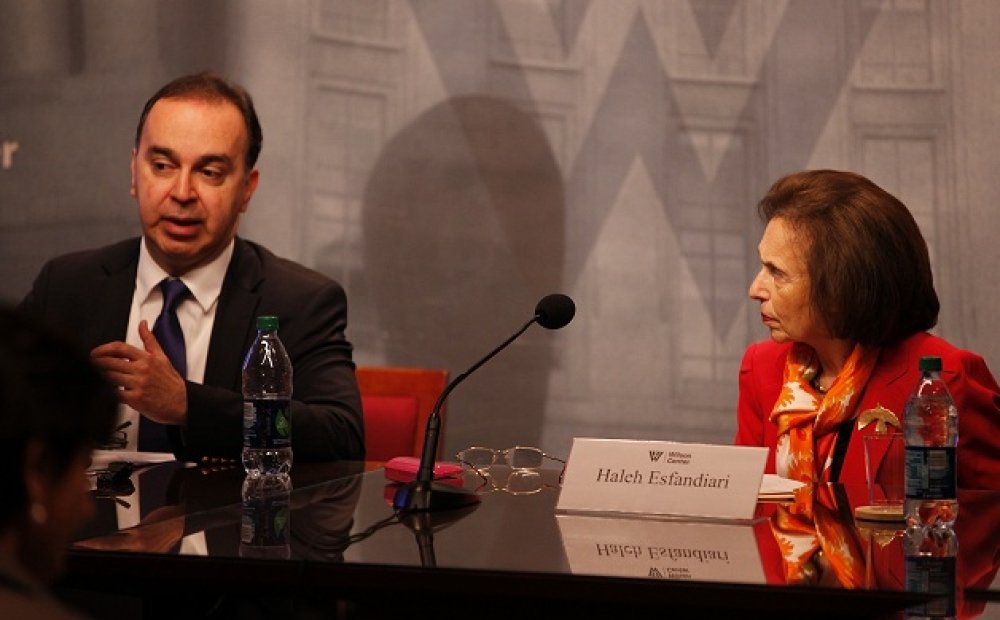Iran and Syria at the Crossroads

Jubin Goodarzi, Assistant Professor and Researcher in International Relations Department at Webster University in Geneva, examined Iran and Syria’s relationship over the last three decades and discussed its implications for the outcome of Syrian conflict.
On June 28, the Middle East Program at the Woodrow Wilson Center hosted a meeting, “Iran and Syria at the Crossroads,” with Goodarzi. Haleh Esfandiari, Director of the Middle East Program at the Woodrow Wilson Center, moderated the event.
Goodarzi provided a background of the relationship between Iran and Syria in the last 34 years and discussed its key aspects and importance for both countries. He noted that the relationship is critical due to Iran and Syria’s geopolitical location in the region and because it is an important example of Arab -Iranian collaboration. Goodarzi stated that the relationship has gone through several phases during which the power structure and dynamics have changed since the 1980s. According to him, in the earlier phases, Syria was more powerful and dominant mainly because of the support it received from the Soviet Union and the fact that Iran was at war with Iraq; however, as the geopolitical status of the region changed, so did the relationship. As a result, Iran currently plays a more powerful and dominant role in the relationship, particularly since 2011. Goodarzi noted that Iran’s policy toward Syria has two key aspects: Iran wants to ensure that it is considered a dominant power in the region and that a regime hostile toward Iran does not come to power in Iraq, since Iraq is more important to Iran than Syria.
He stated that when the unrest started in Syria in 2011, Iran was faced with “two unattractive alternatives,” either to support the Syrian regime or do nothing in the hope that the subsequent regime would not be hostile toward Iran—“Iran chose the former.” However, Iran’s position toward the Syrian crisis has evolved over time. According to Goodarzi, at some point in 2012, the Iranians reached out to a number of Syrian opposition groups trying to assess their position. Since that did not produce any results, Iran decided to maintain its support for the Bashar al-Assad regime; and by the end of the year, it had turned into a proxy war with the United States, Europe, and Saudi Arabia supporting the opposition and Iran and Hezbollah supporting Assad. Nonetheless, with the Arab League and the UN’s efforts to mediate the conflict in Syria, Iran has been keen to engage in the diplomatic processes to resolve the conflict and to play a role in determining the future of Syria more so since it has realized that the status quo is no longer sustainable; thus, it is searching for an exit strategy.
Goodarzi argued that the Iran-Syria alliance has a defensive component to it that often goes unnoticed. He said that Tehran perceives that the West is aiming for regime change in both Tehran and Damascus. Thus, Syria is viewed as “the frontline of defense,” and if the Assad regime collapses, Iran is going to be targeted next. Iran is also concerned about spillover effects in Iraq that could potentially lead to the overthrow of the current regime and ethnic fragmentation of the country, which would have implications for Iran regarding its own ethnic minorities, particularly the Kurds. Goodarzi concluded that Iran has numerous incentives to engage in negotiations and the Syrian peace process, including its desire to portray itself as a key regional actor, preventing further spillover to Iraq and Lebanon, avoiding further polarization and sectarian tensions in the region, and facilitating the emergence of a national unity government in Damascus that is not hostile toward Iran.
By Afarin Dadkhah, Middle East Program
Speaker
Hosted By

Middle East Program
The Wilson Center’s Middle East Program serves as a crucial resource for the policymaking community and beyond, providing analyses and research that helps inform US foreign policymaking, stimulates public debate, and expands knowledge about issues in the wider Middle East and North Africa (MENA) region. Read more
